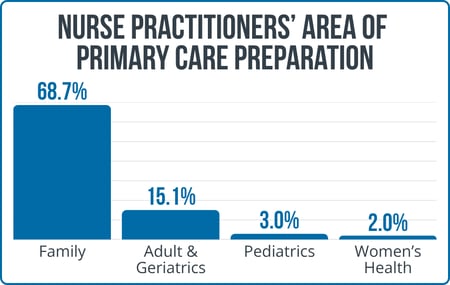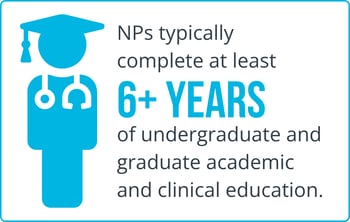How Nurse Practitioners Are Expanding Access to Care and Finding New Opportunities in Locum Tenens

More than 431,000 licensed nurse practitioners (NPs) care for nearly one billion patients each year, ensuring consistent access to high-quality care across the United States. As patient demand rises and physician shortages persist, NPs are helping healthcare systems maintain continuity, strengthen stability, and improve responsiveness across both primary and specialty care settings.
How Nurse Practitioners Are Expanding Access to Care
Filling Critical Needs in Primary and Specialty Care
As physician shortages continue to challenge healthcare systems nationwide, nurse practitioners are stepping in to help maintain access and quality of care. According to the American Association of Nurse Practitioners (AANP), approximately 90% of NPs are certified in an area of primary care, and nearly 69% actively practice in primary care settings, expanding access to preventive and routine services for patients across the country.
Within their areas of certification, nurse practitioners also contribute to key specialties, including women's health, oncology, behavioral health, and emergency medicine. By practicing across a range of clinical settings, they help maintain continuity of care for patients, particularly in rural and underserved communities where provider shortages are more severe.
Strengthening Access Across Care Settings
Across hospitals, outpatient clinics, specialty practices, and community health centers, nurse practitioners are essential to delivering timely preventive, acute, and chronic care. Their ability to manage a wide range of patient needs helps minimize delays in treatment and improve the overall patient experience.
By emphasizing education and prevention, NPs help patients stay engaged in their health and reduce unnecessary gaps in treatment. In hospitals and specialty practices, they enhance coordination and promote smoother care transitions between providers and settings.
Enhancing Team-Based & Collaborative Care
Whether practicing independently or as part of an interdisciplinary team, nurse practitioners collaborate closely with physicians, nurses, and other clinicians to coordinate care, reduce bottlenecks, and improve outcomes. Their preventive focus and comprehensive approach to care make them central to advancing patient-centered, team-based models that expand access and improve quality.
Employment for nurse practitioners is projected to grow by 40% from 2024 to 2034, much faster than the average for all occupations. The projected growth of nurse practitioners reflects increasing demand for healthcare services and highlights the essential role nurse practitioners play in improving access, continuity, and quality of care across the United States.
The Added Value of Locum Tenens Nurse Practitioners
While nurse practitioners already play a vital role in care delivery, locum tenens jobs enable them to expand their reach even further by strengthening clinical teams, supporting patient access, and helping healthcare organizations adapt to changing workforce demands.
How Health Systems Benefit from Locum Tenens Nurse Practitioners:
- Ensure Care Continuity: Locum tenens nurse practitioners help maintain seamless care amid fluctuating patient volumes, unexpected clinician turnover, or persistent staffing shortages.
- Expand Healthcare Access: In rural areas where healthcare access is limited and clinical support is in high demand, locum tenens nurse practitioners provide essential, timely, and reliable care to patients.
- Support Clinician Well-Being: As permanent staff face increasing workloads, locum tenens nurse practitioners ease the burden, helping to reduce burnout and promote a more sustainable work environment.
How Nurse Practitioners Benefit from Locum Tenens:
- Improve Work-Life Balance: The adaptable nature of locum work allows locum tenens nurse practitioners to select assignments that fit their lifestyle, personal goals, and preferred schedule.
- Enhance Clinical Skills: Locum tenens nurse practitioners can strengthen their skill set by taking on locum tenens jobs in new clinical environments or with diverse patient populations.
- Boost Earning Potential: Locum tenens nurse practitioner roles usually offer higher pay than permanent positions, due to the temporary nature of their role and rising demands for care.
- Explore New Destinations: With locum opportunities available across the country, locum tenens nurse practitioners can explore cities or regions while advancing their careers.
At Medicus, we are proud to partner with exceptional nurse practitioners who bring skill, compassion, and adaptability to every locum tenens job. We also collaborate with healthcare organizations that rely on nurse practitioner coverage to maintain access to care and deliver consistent, high-quality outcomes. By connecting talented locum tenens nurse practitioners with hospitals, health systems, and clinics nationwide, Medicus helps ensure patients continue to receive the care they depend on while empowering clinicians to build meaningful, rewarding careers.
Frequently Asked Questions About Nurse Practitioners:
How Many Nurse Practitioners Are There in the United States?
There are over 431,000 nurse practitioners in the U.S., according to AANP.
How Many Nurse Practitioners Work Locum Tenens Jobs in the United States?
As of October 2025, approximately 2.5% of nurse practitioners in the U.S., or about 1 in 39 NPs, work locum tenens jobs either as a career or in addition to their full-time position, according to Medicus' proprietary data.
What is the Average Age of Nurse Practitioners in the United States?
The median age of nurse practitioners in the U.S. is 43 years old.
How Long Does It Take to Become a Nurse Practitioner?
Nurse practitioners complete at least 6 years of undergraduate and graduate academic and clinical education. After completing their Bachelor of Science in Nursing (BSN), they must pass the NCLEX-RN exam, then proceed to an NP-focused graduate program, such as a Master of Science in Nursing (MSN) or a Doctor of Nursing Practice (DNP).
How Long Does It Take for a Nurse Practitioner to Obtain a New State License?
Nurse practitioner licensure timelines and fees vary, with the time to obtain a new license ranging from 2 weeks to 6 months, depending on the state.
Which Specialties Can Nurse Practitioners Practice?
Nurse practitioners work across a wide variety of medical disciplines, with their scope of practice ranging from preventive and primary care to acute and specialty medicine. According to AANP, around 87% of nurse practitioners were certified in primary care. Among them, nearly 69% specialize primarily in family medicine, while others work in adult and geriatric care, pediatrics, or women's health.
Which Clinical Settings Do Nurse Practitioners Work In?
Can Nurse Practitioners Work Independently?
To date, nurse practitioners in 27 states, Washington, D.C., and two U.S. territories have been granted full practice authority, according to AANP. This designation allows nurse practitioners licensed in these states to practice with full autonomy, which includes the ability to evaluate patients, diagnose conditions, prescribe medications and controlled substances, develop treatment plans, and more.
Can Nurse Practitioners Prescribe Medication?
Yes. In many states, nurse practitioners are authorized to prescribe medications. However, their prescribing authority varies by state. In states with full practice authority, NPs can prescribe medications independently without physician oversight. In others, NPs operate under reduced or restricted practice authority, meaning they must collaborate with a supervising physician for specific prescriptions or clinical situations.
What is the APRN Licensure Compact?
The APRN Licensure Compact is an interstate agreement that will allow nurse practitioners licensed in one participating state to practice in other member states with ease. Once enacted, this agreement will simplify the licensing process, helping to reduce costly delays and make it easier for nurse practitioners to provide quality care wherever patients need it most.
Interested in working as a locum tenens nurse practitioner with Medicus? Explore our current locum tenens nurse practitioner jobs here, or complete the short form below to connect with a dedicated Medicus recruiter.


